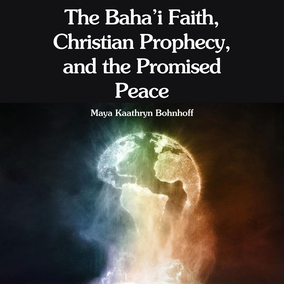The views expressed in our content reflect individual perspectives and do not represent the authoritative views of the Baha'i Faith.
The laws of every prophet bring humanity new standards to live up to—but they also bring us beautiful imagery to sustain our inner lives.
In addition to the figurative language in which the spiritual laws themselves may be expressed, there is often a metaphorical significance to the specific actions the laws require of us. For while the laws may have the obvious benefit of offering pragmatic responses to existential dilemmas, they also force us to act out dramatically in the physical world what we are trying to accomplish in the spiritual world:
God has created all earthly things under a law of progression in material degrees, but He has created man and endowed him with powers of advancement toward spiritual and transcendental kingdoms. – Abdu’l-Baha, The Promulgation of Universal Peace, p. 302.
The correlation between healthy actions and spiritual growth may not be so apparent with the laws that are basically restrictive and prohibitive in nature, but it is there all the same. For example, the Jews may have thought of the Mosaic dietary laws as arbitrary, but they followed them anyway as a demonstration of their faith in the authority of Moses and their obedience to the laws of God. As they practiced this reverence for divine authority, they received the ancillary benefits of the fact that the creator of the law knew something about health that they did not. Now that science has discovered how various diseases are contracted, we can understand the scientific or practical basis underlying the dietary laws of Moses and realize how these “restrictions” were actually a source of liberation—from disease or even death.
Therefore, in perceiving the divine logic in the laws governing physical action and learning to follow the conduct prescribed by the messengers of God, we are training ourselves to have faith in the long-term benefits that the ostensible restriction imposes. It is then possible for us to apply this lesson to our compliance with other spiritual laws, and we can begin to accept the laws of the new prophet as benign guidance and a loving gift. From such a perspective, the word law takes on an entirely new connotation.
Like their counterparts in the phenomenal world—laws that describe physical reality—God’s divine ordinances are thus pragmatic, logical, and beneficial. Furthermore, as we act out the divine ordinances, we are gradually enabled to appreciate ever more profoundly the beneficence of God in educating us:
True liberty consisteth in man’s submission unto My commandments, little as ye know it. Were men to observe that which We have sent down unto them from the Heaven of Revelation, they would, of a certainty, attain unto perfect liberty. Happy is the man that hath apprehended the Purpose of God in whatever He hath revealed from the Heaven of His Will, that pervadeth all created things. – Baha’u’llah, The Most Holy Book, pp. 63-64.
Understood in the light of this statement by Baha’u’llah about “true” liberty—as opposed to the concept of total license that currently passes as liberty—the laws brought by the messenger of God never prevent the full and complete utilization of the physical experience that is our participation in this foundational part of our eternal lives. On the contrary, even those laws that imply restriction in some physical enterprise ultimately encourage the most fulfilling use of it.
Stated another way, the laws of the manifestation enable us to experience the metaphorical value of the physical world, even when we as followers are unaware that we are doing anything other than obeying divine authority.
The laws that provide creative use of our physical lives reinforce the metaphorical value of that experience perhaps even more obviously than the laws of admonition and prohibition. The laws governing our physical lives change from one prophet to the next, so that they accurately describe the relative progress in the stages of development of humankind. This progress of the human body politic is itself essentially metaphorical in nature, in that a society acts out literally figurative or spiritual understandings and perceptions.
For example, when law creates institutions, organizational structures, and codes of behavior that foster advancement, the law becomes an integral part of our efforts to make and dramatize spiritual progress. Thus, in addition to the long-range benefit of laws governing our physical lives, such laws have the immediate effect of creating for each individual a spiritual atmosphere through a social environment that is conducive to moral development.
One of the best examples of this relationship can be witnessed in our rapidly deteriorating natural environment. We are only beginning to understand the profound influence that every aspect of our physical environment has on our mental, emotional, and spiritual conditions. On the most basic level, we mammals require air, water, nourishment, and fellowship. We presently cannot depend on any of these. The air is polluted, often a source of disease, even as is the chemically treated water, the inorganic and chemically preserved foodstuffs, while the society which should provide us with safety and assistance in constructing a healthy family seems bent on tearing at the very fabric of familial and community life.
But the prophets have always understood this relationship, and they have poignantly reflected that understanding in their laws, whether the law describes how we conduct human relationships, organize our lives, care for our bodies, or associate with other human beings. As an example, consider the following passage about the inner or spiritual effects of the Baha’i law requiring simple outward attention to physical cleanliness:
External cleanliness, although it is but a physical thing, hath a great influence upon spirituality. For example, although sound is but the vibrations of the air which affect the tympanum of the ear, and vibrations of the air are but an accident among the accidents which depend upon the air, consider how much marvelous notes or a charming song influence the spirits! – Abdu’l-Baha, Tablets of Abdu’l-Baha, Volume 3, pp. 581-582.
















Comments
Sign in or create an account
Continue with Googleor